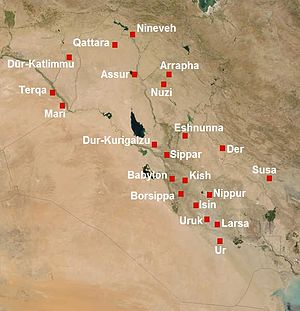Ibal-pi-el II


Ibal pi’el II was a king of the city kingdom of Eshnunna in ancient Mesopotamia. He reigned c. 1779–1765 BC).[1]
He was the son of Dadusha and nephew of Naram-Suen of Eshnunna.
He conquered the cities of Diniktum and Rapiqum.[2] With Ḫammu-rāpi of Babylon, and the Amorite king Shamshi-Adad I he besieged the kingdom of Malgium until its ruler bought them off with 15 talents of silver.

He was a contemporary of Zimri-Lim of Mari, and formed powerful alliances with Yarim-Lim I[3] Amud-pi-el of Qatanum, Rim-Sin I of Larsa and most importantly Hammurabi of Babylon,[4] to appose the rise of Shamshi-Adad I in Assyria (on his northern border) who himself had alliances with Charchemish, Hassum and Urshu[5] and Qatna.
Some scholars have suggested the biblical king Amraphel[6] may have been Ibal Pi-El II of Esnunna.[7][8] While others[9][10] consider Ameraphel to be Hammurabi.
He was killed by Siwe-Palar-Khuppak of Elam, who captured Eshnunna, and he was succeeded by Silli-Sin.
References
[edit]- ^ Van De Mieroop, Marc (2007). A History of the Ancient Near East (2 ed.). Blackwell Publishing Ltd. pp. 99–100.
- ^ E. Sollberger, The Cambridge Ancient History, Volumes 1-2 (Cambridge University Press, 1970) p7.
- ^ Dalley, Stephanie (2002). Mari and Karana: Two Old Babylonian Cities. Gorgias Press LLC. p44.
- ^ William J. Hamblin (2006). Warfare in the Ancient Near East to 1600 BC: Holy Warriors at the Dawn of History. p. 254.
- ^ Michael David Coogan (2001). The Oxford History of the Biblical World. p. 68.
- ^ Genesis 14:1-17.
- ^ Amraphael at Catholic Encyclopedia.
- ^ Micael Roaf "Cambridge Atlas of Archaeology - king lists p 111 and pp 108-123.
- ^ Catholic Encyclopedia.
- ^ Jewish Encyclopedia.